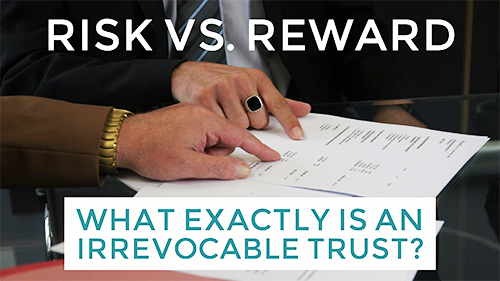
In the simplest terms, an irrevocable trust is a specific agreement between the individuals or entities creating the trust, the trustee (or trustees) who will manage the trust, and the beneficiaries that will benefit from the trust. The trust creator must follow certain legal requirements, sign the trust document, and then transfer any property to the trust that should be included to pass to beneficiaries. If they don’t title the properties or identify the assets in the trust’s name, the court will likely disallow those specific assets from inclusion in the trust.
What makes an irrevocable trust different from other trusts is that the creator cannot change their mind, alter it, or rescind the trust no matter what the circumstances. Imagine if your child or nephew that you named in the trust decides to ignore you or treat you poorly. What if you are neglected by the beneficiaries? This is a risk you need to weigh when determining if this is your best option.
However, there are many tax and other benefits related to this type of trust, which is why some people of means and wealth value transferring their assets in this manner. However, the one caveat is that the creator of an irrevocable trust must be prepared to live with it, even beyond their death, no matter what change of circumstances can occur.
It cannot be taken lightly, since it is truly “irrevocable” once signed, not matter what your beneficiaries do after the preparation of the trust. So, be sure that the benefits, both tax and otherwise, will be worth it in the end.
A minor’s trust that is included in their parent’s estate plan will inherit their share of the assets in the trust upon their parent’s death, even though the creator of the trust, their parents, are no longer able to direct the assets. This is one of the main reasons to create an irrevocable trust. In other cases, it could be a disabled spouse, adult child, or parent that you wish to provide for in the future.
It is imperative that you speak to an experienced estate and trust attorney who will guide you in the right direction. Please call T.R. Spencer Law Office at 801-566-1884 or send us an email at info@trspencer.com. Our knowledgeable trust attorneys will help you decide what estate plans are appropriate for your loved ones.